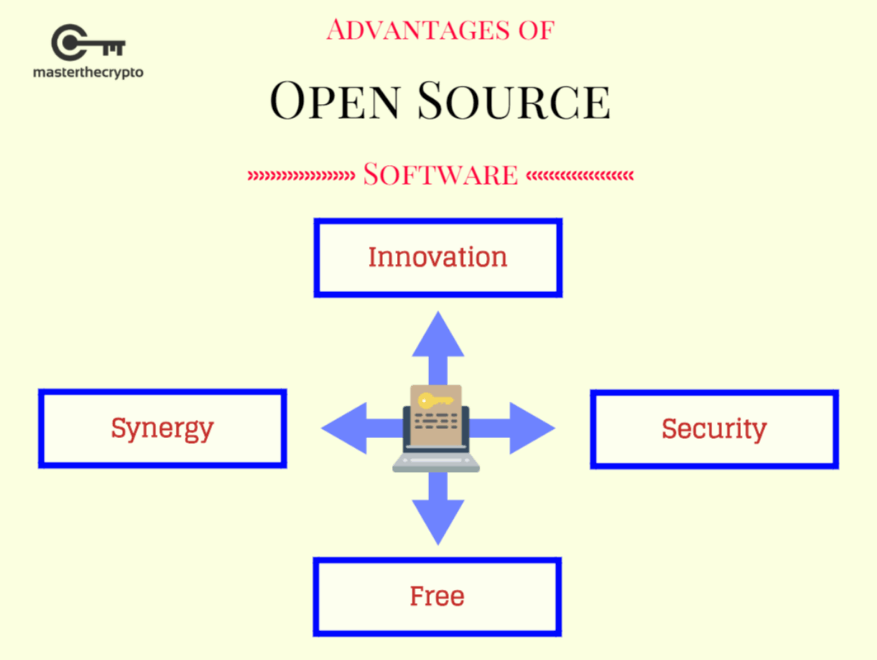This guide takes a look at open source technology in cryptocurrency, evaluating the benefits and importance of open source technology in cryptocurrency and blockchain
The most defining characteristic of any cryptocurrency is its nature of decentralization, where there is no central authority in the network and all participants are created equal. The creation of Bitcoin – the first decentralized cryptocurrency – is regarded as a revolutionary technological advancement which spurred the development of a vibrant ecosystem spanning thousands of coins and tokens, each with a different application. At the foundation of cryptocurrencies is open source software; this enabled all the benefits of decentralization that includes transparency, security and immutability.
What is Open Source
Open source is defined as anything that is publicly accessible and free to use, usually referring to software development. In other words, everyone is free to analyse, distribute and modify the software. Open source software is often produced collaboratively for a common good, and it is shared freely and published transparently for anyone to benefit from. No central entity, company or single individual controls the software. This trait of decentralization – as can be seen from cryptocurrencies – has powerful benefits that are reshaping our world.
(See also: ICO Investing Strategy: Making Money off ICOs)
How Common is Open Source Technology?
Open source software isn’t specific or unique to the cryptocurrency industry. There are many technologies utilizing open source software that represents an integral part of our lives.

Whenever you’re visiting sites like Google, Facebook or Wikipedia, you can be assured that the servers that enable you to get the data you need are supplied by computers running on Linux software. Even when you’re using your Android phone or your laptops, chances are that they are powered by the Linux operating system.
Linux is one of the most powerful operating system known for its speed and performance and is growing at a rate much faster than any other computer systems. The best part about Linux however, is that it is open source. It isn’t developed by a company or a person, but rather, a product of development from thousands of individuals that have contributed their expertise, knowledge and skills to create a powerful software.
(Read also: Understanding Cryptocurrencies: Game of Thrones Edition)
Advantages of Open Source Software
Let’s take a look at the benefits of open source technology:

1. Collective Innovation
Anyone from all corners of the globe can contribute to developing the underlying code of the software, fostering innovation.
Tens of thousand of minds – with a collective interest in creating a revolutionary technology – is better than a couple of minds in a corporate setting working on a proprietary software
It’s easy to see how a community of participants, bounded by the same vision and interest, would be ultra-incentivized to constantly enhance the technical features of the software and ensure its security. Moreover, the developers of the open source software would be the end-users themselves and would be best suited to understand the user experience and elements that should be integrated within the software. Bitcoin core’s source code reference itself is made up of over 15,000 unique contributions from over 450 individual developers. (See more: Is it Too Late to Buy Bitcoin and Is It too Late to Invest in Cryptocurrency?)
It could also be argued that the occurrence of the many varieties of hard forks of a single currency – such as Bitcoin – is a representation of the innovation of the crowd. Thus far, Bitcoin’s reference client has been forked no less than 10,000 times! Anyone can create a different version of a cryptocurrency since the underlying software codes are public and open. For instance, Bitcoin Cash was created by a sizeable portion of the Bitcoin community to address the issue of scalability of the network.
2. Security
The collective power of the crowd greatly enhances the security of an open source software. As stated by the founder of Linux, Linus:
“Given enough eyeballs, all (software) bugs are shallow”
Since open source software allows anyone to evaluate the codes, there’s much better chances of spotting a defect (or what you call ‘bug’ in computing terms) and fix them before it is exploited. In essence, there’s a higher probability for thousands of people to find anything wrong in the codes as compared to a small group of people in a closed, commercial environment. (Read more: A Guide To Fundamental Analysis For Cryptocurrencies)
Once a fix is found for any bug, an upgrade is required to ensure that the new version of the software is immune to the flaw. Just for Bitcoin alone, there’s been close to 48 upgrades or code revision.In the case of Ethereum – the second largest cryptocurrency – there’s been 61 upgrades (called Ethereum Improvement Proposals or EIP) so far. Every upgrade for a software makes it more secure and robust.
3. Absolutely Free
Perhaps the best thing for users is that they can participate in the Bitcoin – or any other cryptocurrency – network at no cost. All they have to do is to download the open source software of a cryptocurrency and officially become a full node, enabling you to verify transactions and have full control over your cryptocurrency.
If you’re not a full node, you have to place your trust in the service providers (e.g. your exchange or crypto wallet). A powerful benefit of blockchain technology is that the entire network is created to be trustless; you have the complete rights of fully owning your cryptocurrencies and how they’re managed without trusting any entities. Being a full node ensures that.
(See also: How Exchanges are Manipulating the Cryptocurrency Market)
4. Synergies and Interactions
Open system facilitates the organic growth of synergies and interactions between the many applications within the network, which would've been otherwise impossible in a closed, proprietary system.
Case in point: Ethereum
Ethereum is the leading platform that expands the functionalities of Blockchain technology. Using a custom programming language and unified standards, anyone can create Decentralised applications (dApps) and smart contracts that seamlessly integrate with one another, exponentially increasing the value and utility of the entire network.
(Read more: Guide to Ethereum Sharding: Ethereum's Scalability Solution)
Open Source: A Force of Good
The objective of open source software is to create and advance a much-needed solution to current problems that is open, free and easily accessible to everyone. The constant pursuit of perfection by a large group of like-minded individuals ensures the development of a highly resilient and versatile codebase. This is manifested through the advent of cryptocurrencies, that started with the creation of a decentralized currency, Bitcoin.
As the embodiment of a revolutionary ideological, political and economic system, Bitcoin was created to solve the deficiencies of the current financial system. The open source nature of Bitcoin and cryptocurrencies – in general – enabled for true decentralization, allowing the creation of a fair and transparent system of value transfer. This powerful idea has now been translated into a vibrant cryptocurrency economy with thousands of applications and use cases that are set to revolutionize our world.
Beneficial Resources To Get You Started
If you're starting your journey into the complex world of cryptocurrencies, here's a list of useful resources and guides that will get you on your way:

Trading & Exchange
- Crypto Guide 101: Choosing The Best Cryptocurrency Exchange
- Guide to Bittrex Exchange: How to Trade on Bittrex
- Guide to Binance Exchange: How to Open Binance Account and What You Should Know
- Guide to Etherdelta Exchange: How to Trade on Etherdelta
- Guide To Cryptocurrency Trading Basics: Introduction to Crypto Technical Analysis
- Cryptocurrency Trading: Understanding Cryptocurrency Trading Pairs & How it Works
- Crypto Trading Guide: 4 Common Pitfalls Every Crypto Trader Will Experience
Wallets
- Guide to Cryptocurrency Wallets: Why Do You Need Wallets?
- Guide to Cryptocurrency Wallets: Opening a Bitcoin Wallet
- Guide to Cryptocurrency Wallets: Opening a MyEtherWallet (MEW)
Read also: Guide on Privacy Coins: Comparison of Anonymous Cryptocurrencies and Guide To Cryptocurrency Trading Basics: Do Charts & Technical Analysis Really Work?
Get our exclusive e-book which will guide you on the step-by-step process to get started with making money via Cryptocurrency investments!
You can also join our Facebook group at Master The Crypto: Advanced Cryptocurrency Knowledge to ask any questions regarding cryptos!

I'm Aziz, a seasoned cryptocurrency trader who's really passionate about 2 things; #1) the awesome-revolutionary blockchain technology underlying crypto and #2) helping make bitcoin great ‘again'!

